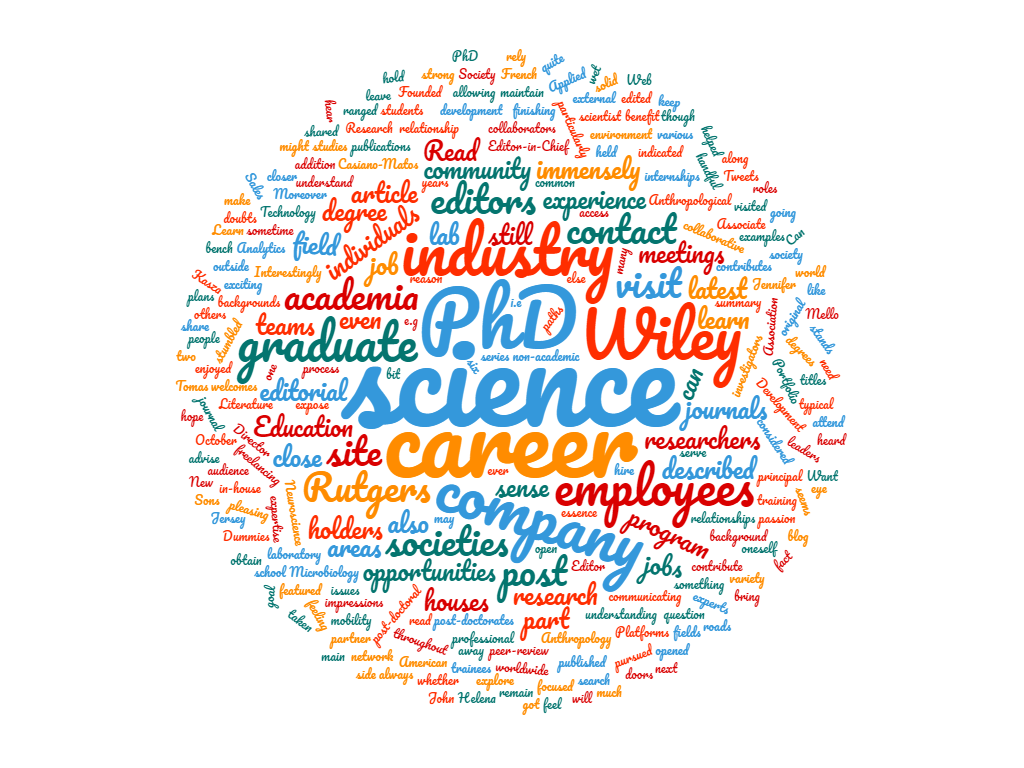by Helena Mello Founded in 1807, Wiley Publishing (then John Wiley and Sons) is a worldwide company with over 1600 journals published. On October 28, 2019, the Rutgers iJOBS program visited Wiley’s New Jersey site to hear from a variety of employees on the publishing industry and where the company stands within it. There are two main areas within Wiley: research and Education (Wiley Education houses the For Dummies series!). The visit was focused on the scientific publishing side of the company and I will share my impressions of the site visit in this article. It is quite common to question oneself about a career outside of academia. “What about all the laboratory training I have got?”, “Am I still going to be a scientist if I leave the lab?”, or “Can I even do something else?”. These doubts are part of the reason we have the Rutgers iJOBS program along with the iJOBS blog. The goal of iJOBS is to expose graduate students and post-doctorates to non-academic careers that need scientific experts. In that sense, it was pleasing to learn that the employees at Wiley feel very much in contact with the even though they are not in academia. Most editorial roles within Wiley maintain a close relationship with scientific societies, particularly those that partner with the company for their journal publications. Some examples are the American Anthropological Association and the Society for Applied Microbiology. These societies rely on Wiley’s 200+ years of publishing experience to advise on whether to make their journals open access or to obtain understanding of their audience. In addition to the societies, the editors at Wiley are always in contact with external editors, i.e. researchers that serve in the peer-review process. These individuals are principal investigators and post-doctoral researchers in academia. These relationships contribute to what the editors described as “a strong feeling of being part of the scientific world”. Moreover, it is typical for the publishing houses to attend society meetings. At these meetings, they can network with their collaborators, and also keep an eye on the original research that may be featured within their next issues.  We heard from six employees about their career paths before and within Wiley. While all of them hold PhD degrees, their fields of expertise ranged immensely: from Neuroscience to Anthropology and French Literature. In that sense, it seems that the roads taken to the publishing industry were not the same. Some had pursued internships or freelancing opportunities while in graduate school, others had stumbled into publishing sometime after finishing their studies. In essence, the industry welcomes people from various backgrounds, which also contributes to the collaborative environment all the employees have described. Interestingly, all of them have held a handful of throughout their careers in publishing, e.g. Associate Editor, Editor-in-Chief, Publishing Director. This indicated to me that the company has solid professional development plans while allowing for in-house mobility. In fact, while most graduate degree holders would search for jobs within editorial teams, there were other teams that hire graduate degree holders at Wiley. These are: Portfolio Development, Research Analytics, Technology and Web Platforms, and Sales. All of these areas benefit immensely from individuals with a science background and a passion for communicating science. In summary, if you would like to explore career opportunities away from the bench but still remain in close contact with science, a career in publishing might be for you! I hope this post has helped you understand a bit more about this industry and that you enjoyed the read! This article was edited by Jennifer Casiano-Matos and Tomas Kasza.
We heard from six employees about their career paths before and within Wiley. While all of them hold PhD degrees, their fields of expertise ranged immensely: from Neuroscience to Anthropology and French Literature. In that sense, it seems that the roads taken to the publishing industry were not the same. Some had pursued internships or freelancing opportunities while in graduate school, others had stumbled into publishing sometime after finishing their studies. In essence, the industry welcomes people from various backgrounds, which also contributes to the collaborative environment all the employees have described. Interestingly, all of them have held a handful of throughout their careers in publishing, e.g. Associate Editor, Editor-in-Chief, Publishing Director. This indicated to me that the company has solid professional development plans while allowing for in-house mobility. In fact, while most graduate degree holders would search for jobs within editorial teams, there were other teams that hire graduate degree holders at Wiley. These are: Portfolio Development, Research Analytics, Technology and Web Platforms, and Sales. All of these areas benefit immensely from individuals with a science background and a passion for communicating science. In summary, if you would like to explore career opportunities away from the bench but still remain in close contact with science, a career in publishing might be for you! I hope this post has helped you understand a bit more about this industry and that you enjoyed the read! This article was edited by Jennifer Casiano-Matos and Tomas Kasza.
iJOBS Blog